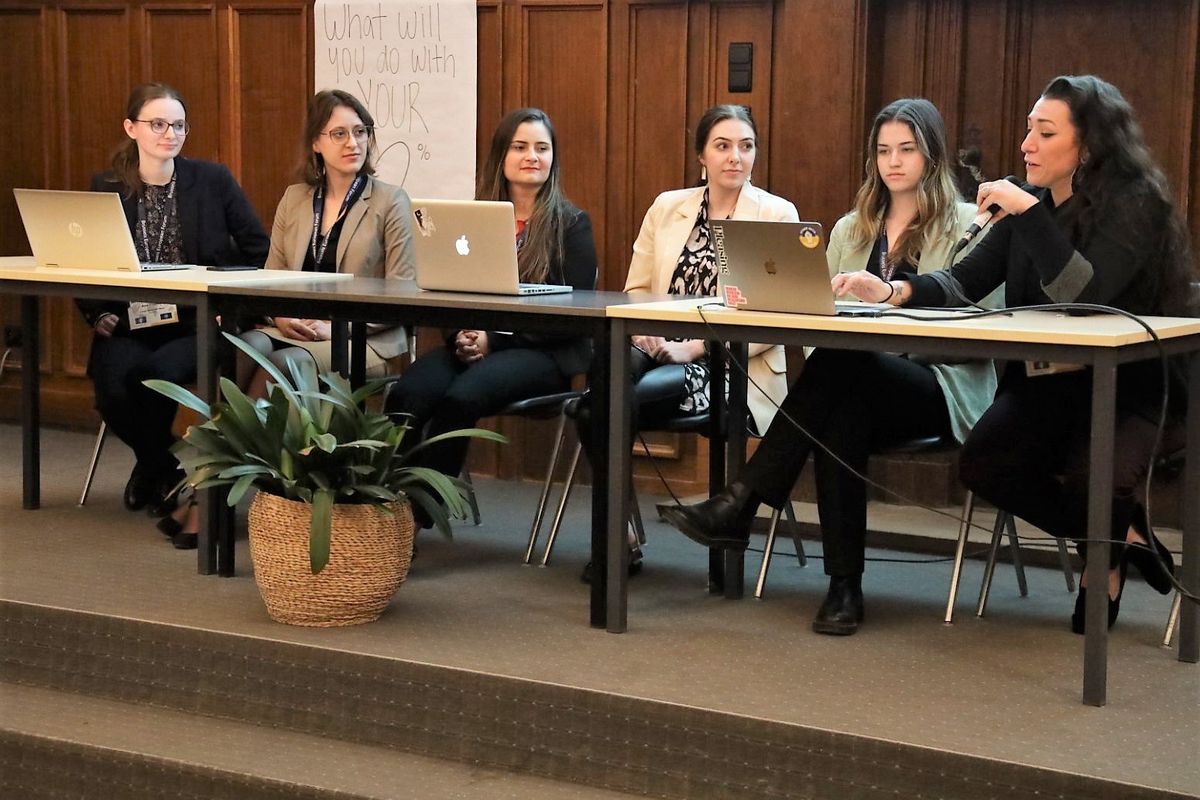‘The importance of global literacy’: Gonzaga University students make trip to Brussels for leadership forum

Amid global tensions surrounding the war in Ukraine, 10 Gonzaga University students are in Belgium this week for a taste of what it’s like to serve as a world leader.
Doctoral, graduate and undergraduate students, as well as an alumna from Gonzaga’s School of Leadership Studies, are participating in the weeklong Brussels European Forum, joining 40 international students to take part in mock sessions of NATO’s North Atlantic Council, the Foreign Affairs Council and G-20.
The goal of the simulations is to find ways to move forward on topics such as global trade, border control, climate change, energy reliance, economic recovery post-COVID-19 and NATO-Russia relations.
Adrian Popa, associate professor of organizational leadership, said participants paused deliberations Wednesday to watch President Volodymyr Zelenskyy of Ukraine address a joint meeting of Congress.
“As much as they’re addressing (these topics), it is still contextualized by the current events that are happening,” Popa said, “which impacts priorities. It impacts strategy. It impacts alliances.”
The North Atlantic Council (NAC) is the principal political decision-making body at NATO. Each member country has a seat at the council.
G-20 is a forum of leading rich and developing nations comprising 19 countries and the European Union. The Foreign Affairs, composed of the foreign ministers from all EU member states, is responsible for the union’s actions on measures including foreign policy, security and trade.
In addition, Gonzaga’s participants have taken roles on the Brussels European Forum’s Global Media and International Advocacy committees. They have each taken on a single role through the entirety of the forum , whether it’s as a journalist, foreign affairs minister or a head of state.
Following Sunday’s opening ceremonies, students have participated in deliberations for upwards of 14 hours per day, Popa said.
“It’s challenging because, quite often, there is juxtaposing positions,” Popa said, “where our students’ values perhaps not aligning with the country or the head of state of a different country … That’s an invaluable skill and role that they play.”
On Wednesday, forum attendees heard from two guest speakers for an in-depth Q&A on emerging trends and policy in the face of the Russia-Ukraine war, said Sherri Lynch, director of community, corporate and external relations for the School of Leadership Studies. Some students also took a trip to Ghent for a canal tour between education sessions, Lynch said.
Students will round out the week with a briefing Friday at NATO’s headquarters in Brussels. Popa said students are encouraged to ask probing questions, given the significance of the opportunity.
“We have a number of alumni from our program that have significant connections that have scaled up our access points at NATO, thankfully and gratefully, due to their advocacy and their support of this program,” he said. “Because of that, we’ve sat down with three-star generals at NATO with briefings that the traditional public would not have.”
Gonzaga first partnered with the Brussels European Forum five years ago. The 2020 iteration was canceled, while Gonzaga students took part last year virtually due to COVID-19 concerns, Popa said.
This year’s participating students are Rebekah Alvord, Haley Anderson, Luke Haley, Brendan Klein, Cailey Kudrna, Rachel Lupo, Haylee Lynch, Shannon Rosenbaum, Elizabeth Schultz and Jennifer Trainer. The group is led by Lynch, along with program graduates Steven Kyle Denton and Bruce Hough.
“There’s a heightened sense and an earnest attempt right now to understand global leadership,” Popa said. “It’s encouraging to see, and yet, it highlights the importance of global literacy … Halfway across the world (in Ukraine) will impact not just the bordering nations, but certainly the west and the world to come for years.”